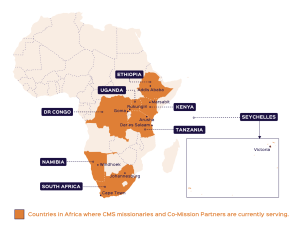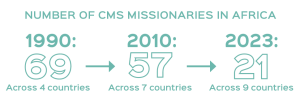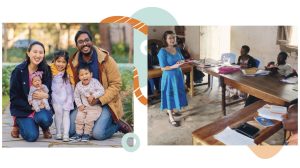Standing together with the church in Africa
CMS Australia Regional Mission Director Elizabeth Richards served in DR Congo for many years with her husband Malcolm and family. Here, she encourages and challenges the CMS fellowship to play our part in the ongoing commitment to both long-term partnerships and new opportunities, so that the church in Africa continues to grow and thrive for generations to come.
Africa is a large continent with over a billion people and 54 countries, including the islands in the Indian Ocean. At the beginning of the 20th century there were approximately nine million Christians, but by the end of the century this number had grown to an incredible 380 million.
CMS has been sending people to serve in Africa for over a hundred years. While our missionary numbers in Africa have diminished today, we continue to receive countless invitations to send people with a range of skills and experience to work alongside African Christians and under local leadership. Our missionaries and Co-Mission Partners (CoMP) are involved in wonderful ministry opportunities in their locations.
I have gained a new perspective and conviction that it is appropriate to both honour our long-standing partnerships and to explore new locations.
Our past
CMS was initially focused on East Africa. The first missionaries to Tanganyika (Tanzania) went in 1893. In 1927, CMS Australia accepted special responsibility for the development of the Anglican Diocese of Central Tanganyika (covering most of the central and west part of Tanzania). In 1947 there were ten African clergy in the Anglican Church in Tanzania. Now there are 28 dioceses, each with dozens (if not hundreds) of trained Tanzanian clergy. Over time we have sent missionaries to other countries including Uganda, Kenya, Ethiopia, Rwanda, DR Congo, Namibia and South Africa.
Independence for many African nations happened in the 1960s. Until that time missionaries were the church leaders and skilled workers. They managed finances and made decisions, providing expertise in a range of areas including medical care, development work, theological education, translation and agriculture. After independence, leadership and management was handed to the national church. Missionaries were no longer in charge and worked in partnership and under indigenous leaders.
Many African nations have a troubled history and at times missionaries have had to make tough decisions about whether to leave or stay. It has been a privilege to stand alongside Christian brothers and sisters, supporting and praying for each other to be strong in faith during times of war, famine, severe dictatorships, genocide, poverty, and rebellion.
There is a lot to celebrate about our past and we praise God for the many ways he has been at work, building his church across the African continent.

The present
We no longer hear stories of white missionaries hiking through the jungle to bring the Good News, while suffering from sickness and persecution. But there are countless stories of African Christians risking much for the sake of gospel witness, and planting churches amidst opposition and hardship. Bishop Cyrille Kambale in DR Congo writes, “Christians in the interior are going through a difficult time with the war and the killings they experience daily but despite these evils, they still have faith in Jesus Christ and hope one day to recover the true peace that comes from God.” CMS Co-Mission Partner Anwar Berhe in Ethiopia shares in this edition about the challenges faced by believers in war zones.
CMS sends people to work at the invitation of and under local leadership. CMS missionaries in African nations are involved in a wide range of ministries using their training and experience to teach and train in theological education in colleges, Bible schools and other programs, work as professionals and academics to mentor and train Christians to provide health services, university student ministry, children’s and youth ministry, translation work and resource development.
Today, the number of people offering to serve in Africa has significantly reduced, but the potential for missionary work remains huge. Africa is in many ways an open door. The size of the church and the population presents challenges for the church, in particular training and supporting church leaders. With the requests we regularly receive, we could place many missionaries in valuable and strategic roles.

Our ongoing commitment
When I first went as a young missionary to DR Congo (Zaire) in 1988, I was excited to be part of something new, to go to a place where we had never sent missionaries. I wondered then why we would keep sending people to East Africa—surely it was time to invest in new, more strategic locations?
After nine years of regular visits to missionaries and church leaders across Africa, in my role as Regional Mission Director, I have gained a new perspective and conviction that it is appropriate to both honour our long-standing partnerships and to explore new locations. We want to be open to God’s leading. One example of this is our response to a request from Archbishop James Wong, which will see Ryan and Lynne Verghese going as our first missionaries to Seychelles this year.
It is a great encouragement to labour together for the gospel, and the presence of missionaries is tangible evidence of our care and partnership. But sometimes we are unable for various reasons to send missionaries to our historical locations, and this can be misunderstood as abandonment. Yet we remain committed to our long-established partnerships, and CMS will always hold a special place in the church in countries like Tanzania and DR Congo, where being CMS opens doors and carries a level of trust.
Working under African leaders
We send people long-term, to develop strong relationships, and learn language and culture, including history and context. It can be very challenging to work in a church context that is different to our own previous experience. Differences can be about anything and everything—from hierarchy, the form of church, whether pastors are paid, the emphasis on prayer, and aspects of theology.
We continue to send people because together we are the body of Christ, and the church is the bride of Christ, purchased with his blood. No church congregation or denomination is perfect, church is made of people in various stages of being transformed and built together. There is much we can learn from each other.
David and Prue Boyd, Judith Calf and Glen and Dominique Turner have recently returned to Australia after many years of serving in DR Congo and Tanzania. They used their skills and experience to teach and train while growing in maturity and being shaped themselves, as they served humbly under local leaders in church, Bible schools, hospitals and church-run schools.
Our African brothers and sisters ask us to walk alongside them and encourage them to stand firm in their faith. It is easy to be influenced by the dominant culture. In Africa some of these influences include family and accompanying obligations, secularism and traditional religion. In her article about the prosperity gospel, Tamie Davis challenges us to think about an appropriate biblical response to those in need who want to pray for God’s blessing and provision.
The Apostle Paul wrote to the church in Ephesus:
“Christ loved the church and gave himself up for her to make her holy, cleansing her by the washing with water through the word, and to present her to himself as a radiant church, without stain or wrinkle or any other blemish, but holy and blameless.” (Ephesians 5:25-27)
As Christ gave his life for the church, it is a privilege to give up our own familiar forms of worship and church structure in order to share in the work of proclaiming the gospel; to be part of this precious, imperfect, worldwide church under the headship of Christ.
Looking to the future
We are committed to working in the African continent into the future. It is a diverse continent that spans Muslim nations, unreached people groups, historically Roman Catholic countries, countries with a strong Protestant church presence, countries where the Anglican church is the state church, increasingly secularised countries, and those with a growing section of highly educated young people. More than 60% of Africa’s population is under 25. This brings enormous potential for youth and children’s ministries as well as work with university students and IFES student movements. CMS missionary Katie Taylor has written about the opportunity to train teachers for Sunday school in her location in Tanzania.
CMS also supports the growing church in Africa through the provision of scholarships. Through our Mission Support Fund, we invest in future leaders, currently providing scholarships for people to study theology, from certificate to master’s levels.
As we speak with inquirers, we will continue seeking to place missionaries with historical partners and we will also seek out new locations. We will emphasise capacity building within the church and in society. We have invitations to send people to exciting ministries in new locations such as Madagascar and Zimbabwe. In southern Madagascar rapid church growth means that new Christians without training are leading congregations. We would love to work in partnership with the church to train leaders in short courses and in formal theological education.
A very tangible way of encouraging Christians is to walk alongside, affirming, sharing, praying, and studying God’s word together. It could be tempting to give a low priority to mission partnerships in countries where there is a history of conflict, corruption, and poverty. People who have spent years barely surviving may lose their gospel focus but fellow workers in the gospel can help reignite their passion, build capacity and enable ministry to grow.

CMS missionaries Ryan and Lynne Verghese and their children, preparing to serve in Seychelles; Judith Calf teaching an Evangelist course.
Mission together
“God is calling the churches of Africa to be missionary-sending churches. Africa should be both an important launching point for sending workers and a think tank for missions issues. For the church in Africa, the twenty-first century is an age of mission opportunity, responsibility, and challenges. … We need to learn from established missionary organisations, including ones from other countries.”[1]
When I meet church leaders in Africa, they often say “it is great that CMS wants to send people to work with us here, but how can we become a church that also obeys the Great Commission and sends people throughout the world?”
We need to consider how CMS, as a long-established mission society might provide the support and encouragement that our African brothers and sisters are asking for. More Christians live in Africa than any other continent. It is right and fitting that the church in Africa increasingly becomes a sending church and that CMS, who was part of taking the gospel to Africa, becomes part of enabling the gospel to go out from Africa to other parts of the world.
Sending and supporting
Currently a third of the world’s Christians live in Africa, and that proportion will only grow in years to come, as the African church plays an increasingly important role in world Christianity.
We recognise the complexities within the nations of Africa, particularly related to a colonial history. We need to be sensitive to young people who are starting to understand and judge their history, including their church history. We want to send people who are willing to be confronted by the colonial history and to live and work with humility and compassion.
We want to send people willing to be partners in the gospel and to work humbly under local leadership. Whether it is working amongst gospel-poor people groups, capacity building for the existing church, youth and children’s ministry, Bible training, using professional or trade skills, or providing support or encouragement for emerging mission sending organisations, there are exciting opportunities for CMS into the future.
GO
Is God calling you to serve the church in Africa? As you consider the part you can play, please pray for strong gospel partnerships between CMS and our African brothers and sisters. Find out more about opportunities to go or contact your local CMS branch.
[1] Africa Study Bible. ‘Africa Can Lead Missions This Century // Africa Study Bible’ The Gospel Coalition, Africa edition. 1 June 2022, africa.thegospelcoalition.org/article/africa-can-lead-missions-this-century-africa-study-bible/












































































































